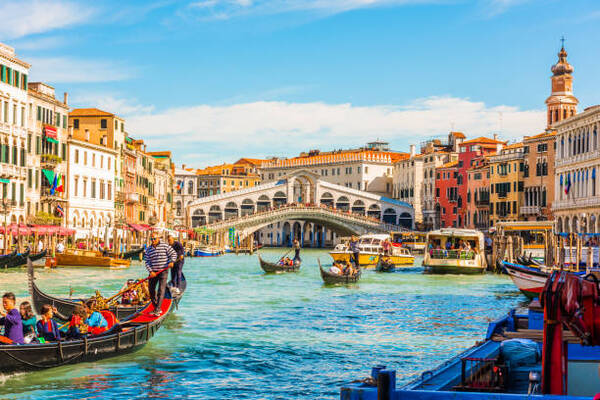≡-Venice Sets New Standards In Italy With Draconian Fines Up To Fifty Thousand Rupees Targeting Tourists Who Endanger Heritage, Public Safety, And Local Communities – Viral of Today
<> Viral of Today <>
Home » EUROPE » Venice Sets New Standards In Italy With Draconian Fines Up To Fifty Thousand Rupees Targeting Tourists Who Endanger Heritage, Public Safety, And Local Communities Published on
August 23, 2025Italy and Venice have introduced strict fines of up to fifty thousand rupees to tackle the growing problem of unruly tourist behavior, aiming to protect the city’s historic landmarks, waterways, and public spaces. With millions of visitors flocking each year, actions like eating on monuments, swimming in canals, littering, or walking around in swimwear not only damage Venice’s delicate infrastructure but also disrupt daily life for local communities. These regulations are part of a wider European effort to enforce responsible tourism, ensuring that travelers enjoy the city while respecting its cultural heritage, safety, and cleanliness.Venice has unveiled a comprehensive set of penalties targeting disruptive tourist behavior, signaling a new era of stricter oversight in one of Europe’s most visited cities. Fines of up to ₹50,000 have been introduced to curb actions that compromise the city’s heritage, cleanliness, and public safety. The updated regulations explicitly forbid eating on historic monuments, swimming in the iconic canals, littering in public areas, and walking around in swimwear outside designated zones. These rules are part of a larger European initiative aimed at reducing disrespectful tourism and preserving the character and livability of popular destinations. Similar measures are already in place in countries such as Spain and Portugal, where authorities have increasingly imposed hefty fines to enforce responsible conduct among visitors.The Italian government has made it clear that these fines are not merely symbolic. Venice’s official government website now lists prohibited behaviors along with their associated penalties, creating a transparent framework that ensures tourists are aware of the boundaries. The regulations serve multiple purposes: maintaining urban cleanliness, safeguarding the cityscape, and promoting public health and safety. Administrative fines range from €25 to €500 (approximately Rs 2,541 to Rs 50,822), depending on the severity of the violation. By enforcing these measures, Venice hopes to protect the delicate infrastructure of its historic streets and waterways while discouraging actions that disrupt everyday life for residents.This trend is not unique to Italy. Across Europe, the summer season has brought a surge in efforts to rein in unruly tourists, particularly in highly trafficked destinations. From driving in flip-flops to smoking on beaches, vacationers are increasingly being held accountable for behaviors that were once overlooked. In Portugal’s popular coastal destination of Albufeira, stepping outside the beach in swimwear can attract fines reaching €1,500 (Rs 1,52,109). Similarly, Spain’s Balearic Islands, including Mallorca and Ibiza, enforce penalties of up to €3,000 (Rs 3,04,218) for consuming alcohol in public spaces. Even smaller missteps, such as reserving a sunbed and leaving it unattended, can now have financial consequences. These measures, though sometimes perceived as excessive, aim to ensure that tourism remains sustainable and that local communities are not unduly burdened by the influx of visitors.Venice, in particular, has focused on the practical application of rules to guide tourists. The city has outlined specific prohibitions designed to protect both its unique urban environment and the experience of visitors. Eating or drinking while seated on the ground, on monuments, bridges, steps, wellheads, or high-water walkways is now subject to fines of €100 to €200 (Rs 10,164 to Rs 20,329). Swimming, diving, or bathing in the canals carries a fine of €350 (Rs 35,575), reflecting the seriousness of safety and preservation concerns in the waterways. Littering or leaving trash in public spaces also incurs a €350 fine, reinforcing the city’s commitment to cleanliness and environmental care. Finally, walking around bare-chested or in swimwear outside designated areas is punishable by €250 (Rs 25,411), encouraging tourists to respect local norms and cultural expectations.These regulations are part of a broader effort to strike a balance between promoting tourism and protecting local life. Venice, like many European cities, relies heavily on its tourism industry as an economic engine, drawing millions of visitors annually. However, unchecked tourist behavior can strain infrastructure, degrade public spaces, and create friction with residents. Authorities argue that these fines are not intended to punish visitors indiscriminately but to cultivate a culture of responsible travel. By setting clear expectations and enforcing rules consistently, cities hope to maintain their historic charm and ensure that tourism benefits both visitors and the communities that host them.Beyond Venice, other European destinations are adopting similar approaches, reflecting a continent-wide shift toward sustainable tourism management. Spain, Portugal, and Italy have recognized that economic gain alone cannot justify the neglect of urban order, public safety, or environmental preservation. By instituting enforceable fines, these countries are signaling to travelers that responsible behavior is not optional but a core part of the modern tourist experience. The underlying message is clear: respect the destination, and it will continue to offer memorable experiences; disregard local rules, and the cost could be substantial.Venice’s recently introduced fines, together with similar actions throughout Europe, signal a significant shift in how tourist behavior and city preservation are being managed. Visitors must navigate these rules thoughtfully, understanding that actions as simple as eating on a monument, swimming in a canal, or leaving trash behind can carry significant financial consequences. These regulations protect not only the cities themselves but also the well-being of residents and the integrity of the travel experience. As Europe continues to refine its approach, responsible tourism is increasingly seen as the key to sustaining the continent’s most treasured destinations for generations to come.ush to encourage responsible tourism while preserving local culture, safety, and the environment.
This information will surprise you!
See also
- Read until the end to discover everything.
- Important information you need to know.
- Interesting facts and helpful tips.
Conclusion
Did you enjoy the news? Keep following us daily!













